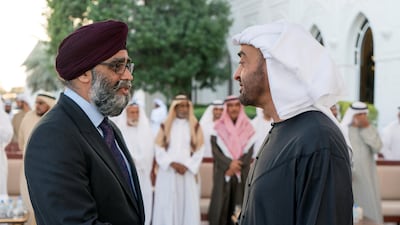ISIL cannot be allowed to increase its presence in Egypt, Canada’s defence minister said in Abu Dhabi on Monday, as he also voiced concerns about returning extremist fighters
Visiting the capital to sign a defence cooperation agreement, Harjit Sajjan said: "ISIS still has a presence in Sinai, and the responsibility to deal with this threat is in the hands of the Egyptian government."
“The movement of the different groups is something that we do monitor quite regularly, so even if we focus on Iraq, we do have troops in Sinai and they are part of the peace mission with the Multinational Force and Observers (MFO).”
Canadian troops have been in Sinai since 1981, as part of the MFO peace mission.
"And that is one of the true peacekeeping missions that we've had in the past and we would like to maintain that," he said in an exclusive interview with The National on Monday.
“Our focus [in Sinai] is to keep peace in that area and to make sure it [the security threat of ISIL] does not grow.”
The minister said hopes to increase the UAE’s involvement in Canadian peacekeeping operations and to work with the UAE on its de-radicalisation programmes.
“In Canada, we have announced our peacekeeping initiative, we engaged in peacekeeping operations and we hosted the UN peacekeeping defence ministerial [gathering],” he said, “And I had a really interesting discussion today on how the UAE can also contribute to this.”
He added that he be working with the UAE on preventing the youth from “being sucked into radical groups”.
“We are also worried about the rise of radicalisation within our youth, and I know it is tremendous work that His Highness [Sheikh Mohammed bin Zayed, Crown Prince of Abu Dhabi and Deputy Supreme Commander of the Armed Forces] has done in this regard, and we want to be able to learn from the experience.
"We did have Canadians who have come in to fight [for ISIL] and we have had them in large numbers," he said in reference to an estimated 180 fighters with links to Canada.
“We use all of our tools, from our laws to surveillance we will make sure we use every tool necessary… and part of the conversation we had today was: ‘How do we prevent our youth from being sucked into these radical groups so that is something that we are going to be working on together?'”
Mr Sajjan comes from a rich policing and military background - he served in Bosnia, and three times in Afghanistan, for which he received the meritorious service medal in 2013 after reducing the Taliban's influence in Kandahar.
Before that he was a detective at the Vancouver Police department investigating organised crime and gangs.
___________
Read more
UAE Foreign Minister tells UN the world stands at a crossroads on extremism
'Teach our young people the dangers of Isil's extremism'
___________
“One thing that I have learned whether dealing with conflict or organised crime, all of these [terrorist] groups require a younger generation to be funnelled in to support their organisations because otherwise they cannot do what they do.”
“So, if we prevent these younger generations from getting sucked into these radical organisations we can then deal with this threat a lot easier.”
“At the end of the day, every family and every parent wants what is best for their children, but if those children feel from what they see around them that there is no future it is easier for them to be sucked into radicalisation.”
“So this is one of the things that I am looking forward to work with in my partnership with the UAE… what I like to do is inspire the younger generation to reach for your goals and raise them even higher.”
He had met earlier with the Minister of State for Defence Affairs, Ahmed Al Bowardi, and they signed a defence cooperation agreement that Mr Sajjan said will open more doors for both nations in the defence field.
“So, this agreement is one of the first steps that will allows us to have a formal arrangement between the two nations in military, and developing on various aspects of training, building capacity… a way of having a formal relationship instead of just doing some private training,” he said.
Later on Monday, the minister met with Sheikh Mohammed at the Sea Palace, and visited Wahat Al Karama, the permanent tribute to soldiers and other Armed Forces members who have lost their lives serving their country.
Canada and the UAE have had a long history of military cooperation and have served together in operations, including in Afghanistan, and Iraq. Moreover, there are around 40,000 Canadians residing in the UAE.
“We used to use an air base here when we were serving in Afghanistan, now we no longer have it. We have our base in Kuwait and serving in Iraq at the moment we provide regional capacity building to feed the rise of the terrorist aspect from Isis to other organisations," he said.
“We have been doing some work with the UAE but it is something that we want to develop further."


